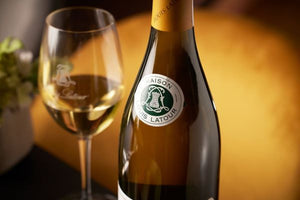Returning to the roots
By: Julia Hanna / September 1, 2023
Florent Latour takes the helm of his family’s centuries-old winemaking company
It’s not a role he sought or expected. But when his brother died of a brain tumor late last year, Florent Latour (MBA 1999) became CEO of Maison Louis Latour, a winemaker established in 1797 in the Burgundy region of France. The 11th generation of his family to lead the storied brand, Latour was living with his wife and two children in Washington, DC, at the time. A veteran tech executive and founder of Mossettes Technologies, he quickly switched gears: “When we lost my brother it was a shock, both personally and professionally,” says Latour. “I’ve been getting quite accustomed to the Dulles-to-Geneva flight, relying on Swiss efficiency to get to Burgundy.”
Running a 226-year-old winemaking company is a bit different from the tech industry where Latour has spent his career, working in software, B2B, and more recently, e-commerce ventures. But the very real work of growing grapes and producing and selling wine is something he has known his entire life. Born in Beaune, Côte d’Or, in the heart of Burgundy, Latour grew up watching his father, grandfather, and great-uncle run the business. “I remember going to my father’s office in town, and like any kid, I was fascinated with the telex and the big closets full of accounting books. I also grew up in the family home in the middle of the vineyards, so I have many memories of seeing all the care and cultivation that’s done before the winemaking even begins.”
Like any new CEO, Latour has spent his first year meeting with customers, partners, and importers. “A key message is that the company will go on as it is—independent, family-owned, family-run, and with the same values and attention to quality,” he says. Finding balance between tradition and new ways of doing things is a challenge that his father and brother faced, he notes, and one that he will grapple with as well, particularly as climate change demands new techniques to ensure optimum harvesting conditions and the highest-quality vintages possible.
“The harvest is earlier; the weather is more erratic—sometimes there’s a freeze in April and more powerful heat waves in the summer. You need to make many small changes so that nothing changes in terms of quality, right? As an example, we will prune the vines in March to encourage later budding and avoid the risk of an early frost.” Latour also points to earlier innovations introduced by his father and brother, who expanded the company’s holdings beyond Burgundy. “We learned from the way things are done in more southern regions and injected that same know-how into our cultivation practices in Burgundy, which means we’re better able to deal with a hotter climate,” he adds.
Describing Maison Latour as a “small multinational,” Latour says about 80 percent of its business is actually outside France; its main markets are in the United States and the United Kingdom (with subsidiaries in both), followed by Japan, Australia, and Canada. The company employs approximately 200 workers, some from families who have worked for Maison Latour for generations. “In Beaune, you need to think beyond compensation to the tools that align and attract workers. People stay with us because it’s a family business, because we take care of them in a way that is very real, through the ups and downs of their lives. HBS gave me the framework to see that very clearly.”
Maison Latour wines have been enjoyed over the centuries by members of the court of Bavaria and guests of the Paris Ritz, in addition to State dinners with US Presidents Eisenhower, Kennedy, and Ford. But Latour understands the importance of making the company’s wines (which range from $18 for a bottle of Ardèche Chardonnay to $350 for a bottle of Corton-Charlemagne) accessible to a new generation of consumers. “It’s an issue that’s common to the business as a whole. We need to attract consumers who are learning about wine differently, who may not be going to a tasting at a store, for example. The in-person, human connection is ultimately what we want to establish, but first they need to know that we exist. It’s a good exercise to be able to communicate our story in a few short sentences.”
Latour is just getting settled into his role. In French, it’s chef de maison and encompasses more than just operations: “It’s also the guardian of key decisions and values.” One of those decisions will revolve around succession; Latour says that Eléonore, his brother’s daughter, will be the 12th generation (and first woman) to lead the business. In the meantime, he will continue to use the strategy of small change and a long view to ensure that Maison Louis Latour wines are enjoyed into the next century. “It may sound a bit counterintuitive, but maintaining continuity and preserving the past is the way you build the future, more so than new, flashy projects,” explains Latour. “It’s the base on which you build, with an ambition that you can deploy 10, 15, 20, 25 years out.”





